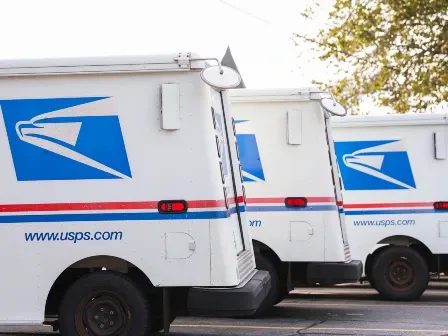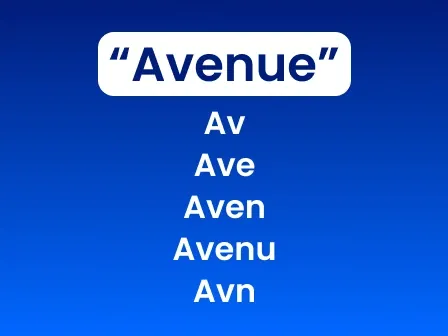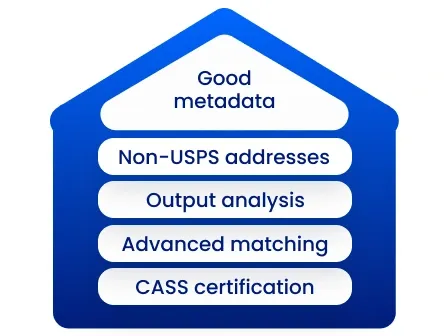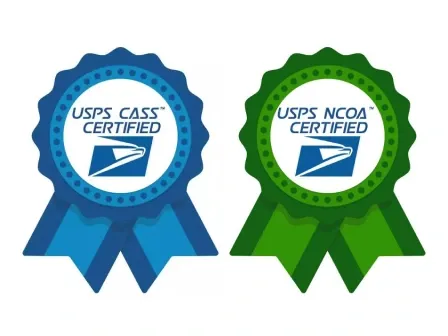What is CASS Certification, and why it might not be enough

USPS CASS™ certification is a program that allows address data providers to demonstrate that their data is validated and standardized according to USPS requirements. CASS stands for Coding Accuracy Support System. A company that can tout that they're CASS-certified delivers a level of trust. It's USPS-approved and meets postal standards.
Let's talk about CASS certification—what it is, why it matters, and why it might not be enough on its own.
As it turns out, Smarty is CASS-certified, meaning the data we provide to you in any of our tools is certifiably correct and considered standardized appropriately to meet postal standards. We take our CASS certification to the next level, though.
Here are a few of our tools that you can check out for 0 dollars, 0 cents, and 0 commitments. Or you can keep reading below to learn more about USPS CASS certification, and why, even though it's pretty cool, it might not be enough to solve your address data woes.
Here's a table of contents to help you get the answer to all of your CASS certification questions:
- What is USPS CASS address validation?
- Importance of USPS CASS certification
- Common address formatting errors
- Implementation of CASS-certified software
- Business applications of CASS-certified solutions
- The CASS certification process
- Comparisons: CASS vs. NCOA systems
- Address update frequency and management
- Handling of uncertified addresses
- Role of CASS processing in mail management
- FAQs for CASS certification
What is USPS CASS address validation?
USPS CASS address validation is the national standard that the USPS created to validate lists of addresses (shows you if they are real or valid according to their address database). If a user submits a list of addresses to a tool that follows the CASS guidelines, the validation tool will return a response of either valid or invalid, highlighting the addresses that don't match the standardization of an address in their authoritative database.
USPS CASS Cycle O, the latest addition to USPS guidelines for standardization and validation, was released on August 1, 2023.
Importance of USPS CASS certification

CASS certification is important to have if you are looking to generate an Intelligent Mail® barcode (IMb) for better mail tracking via the USPS and obtain postal discounts. CASS certification will also help you to save money on mail that is returned to sender or undeliverable as addressed (UAA) because of formatting or standardization issues, boosting your revenue and reducing waste.
CASS certification ensures address accuracy for users looking to send mail through the USPS. It's the USPS mechanism for comparing an input address to a known address in their database. It's the gold standard for aligning your data with USPS address records.
Benefits for businesses
The biggest benefit? Knowing the address is valid. That alone has huge implications. While CASS certification by itself gives very little in terms of direct postage discounts, it's the gateway to larger savings. For example:
- Presorting gets you more of a discount than just CASS alone.
- NCOA (National Change of Address) offers additional discounts above and beyond.
CASS is the first step. If you want the big benefits, like bulk mail delivery discounts, you start with CASS.
Additionally, practical, financial, and regulatory benefits can be gained by businesses and organizations who rely on CASS-certified address data from Smarty.
Perks such as USPS discounts and compliance, reduced undeliverable-as-addressed (UAA) mail, improved deliverability and customer satisfaction, cleaner data for smarter decisions, rooftop-accurate geocoding HIPAA-safe and SOC2-certified mail, and improved automation and scalability are all part of the Smarty vision for your data.
But don't take our word for it. Here are several businesses and organizations who use Smarty's CASS-certified tools to boost ROI, make smarter marketing and scaling decisions, comply with local and federal regulations, and reduce returned mail.
- AIRA - Improved address data quality in IIS systems using Smarty's CASS-certified standardization tools.
- 4Site Studios - Cleaned their database with Smarty to optimize their workflows.
- Faraday - Enhanced their AI customer predictions with cleaner address data going in from Smarty's US Address Verification.
- Shippo - Reduced undeliverable packages using Smarty's CASS-certified data and non-USPS addresses.
- DialCare - Cut down admin costs and boosted customer care using Smarty.
- Majority - Decreased undeliverable credit cards using Smarty's tools, and improved overall customer satisfaction.
- The Epilepsy Foundation - Streamlined dispatch and improved data integrity through verifying and standardizing aggregate and client-entered data with Smarty.
- Lake County GIS - Increased bill and ballot deliverability with Smarty's CASS-certified data and non-postal addresses.
- Express Mapping - Boosted compliance with public notice requirements from beautifully standardized data from Smarty.
- And so many more!
A CASS-certified address, or one that has gone through a CASS-certified process, means it has been standardized to the best possible match without creating a false positive (matching to something it shouldn't, or changing something without telling you in order to obtain a higher match rate).
The goal is to understand what was intended in the input and match it to a deliverable address—without misdirecting mail. That's one of the USPS's core mandates: avoid misdirection of mail.

But here's the thing—CASS certification alone might not be enough. Why? We go into the gory details later.
Common address formatting errors
There are hundreds of ways to format an address:
- Numbers like "100" might be written as "One Hundred."
- Fractions like "1/2" could be spelled out as "one-half."
CASS helps standardize those inconsistencies.
If you're using a CASS-certified service, most of your address formatting mistakes get cleaned up automatically, like changing "Street" to "St" or changing "123 Main Street" to "123 Main St." As long as the address is only slightly malformed or incomplete, the service can probably fix it.
Frequent mistakes to avoid
Casing and capitalization
Smarty returns everything in proper case. Not just title case or lowercase—proper case. That means words that should be capitalized are, and those that shouldn't be, aren't.
For example, we're all familiar with seeing addresses written in all caps like this:
100 ABBA WAY
TAYLORS, SC 29687However, did you know that all uppercase text isn't a requirement laid out by the USPS? The only requirements necessary to follow are that the text is readable and follows USPS OCR address standards. Casing and capitalization can be customized to meet QHIN requirements for healthcare organizations who are interested, using Project US@, but please don't break your backs lifting all those letters into uppercase if you don't need to.
"Misspellings"
Many people rely on their hearing and knowledge base of common words when writing an address. If someone says they live on "Cyprus" Drive, but the listener types in "Cypress" Drive, both are considered correct spellings depending on the location - one's in New York and the other is in Utah. That's just an intentional spelling error, though, and we also need to be wary of unintentional human fat-finger typos. Like spelling "roak" instead of "road."
Non-approved abbreviations
Did you know that the USPS doesn't recognize some street suffixes or predirectional abbreviations? In fact, according to the postal service, there is only one correct version of any abbreviation.

For example, the word "avenue" is frequently abbreviated as:
- Av
- Ave
- Aven
- Avenu
- Avn
But the only abbreviation that the USPS accepts is "Ave."
You can view this library to find a list of USPS-approved abbreviations and their unapproved variants if you're curious.
Any CASS-certified provider can help you fix these issues in a jiffy.
Missing ZIP+4 Code
If the address is matchable, the process adds the ZIP+4 Code for you.
While a ZIP+4 Code isn't a requirement for the USPS to send your mail, it does help the post office determine where to send things and improve delivery time, sometimes allowing your mail to arrive up to 2 days faster. It is also a required component for getting the Intelligent Mail barcode discount and mail tracking capabilities, so it's nice to have a provider who will give that information back to you when you don't have it to begin with.
Duplicate or alias locations
Most organizations can tell that
13960 JAMES BOND RDIs the same address as
13960 JAMES BOND ROADOne is the main address, and the other is an alias. Can you guess which is which? The first one is formatted according to the USPS standards, so that's the main one. The other is the alias.
Guess how many aliases an address can have. The answer is dozens.
What happens when an address doesn't look the same, but is? For example:
1230 North in Provo, UT is also Bulldog Boulevard in Provo, UT, AND Cougar Boulevard in Provo, UT.
This is a real scenario in which addresses change over time. The original street, 1230 North, was renamed after the local High School's mascot (bulldog), and then renamed again when that High School moved and the property was purchased by a local university—and you guessed it—the university's mascot is the cougar.
Even the most intelligent organization without a good address verification system could easily miss this crucial detail when consolidating address data and merging datasets. Maintaining all of these versions of a street combined with the premise number can greatly inflate your marketing costs and skew your expansion efforts, blast through mail budgets, and cause irritation with potential customers and clients when they receive 3-4 of the same piece of mail from your organization.
CASS-certified address validation providers overcome these issues by returning the standardized versions of addresses. For instance, "Eleven Main Street" and "11 Main Street" both become "11 Main St." That makes duplicate identification, matching, and deduplication easy.
And if your address turns out to be an alias for a better-known, more up-to-date one, Smarty will return the most correct version instead.
Impact on mail deliverability

A CASS-certified list means, to the best of USPS's automated systems, the addresses on that list are valid, mailable, deliverable addresses. But still, you need to pay attention to other details:
- Is the address vacant?
- Is it residential or commercial?
- Is it active?
CASS certification gets you close, but your organization still needs to apply business logic to make the most beneficial mailing decisions for your industry and goals.
Implementation of CASS-certified software
Over the years, companies not in the address verification business have come to Smarty after trying to create an internal verification system. They're frustrated and say they had no idea what they were getting into. And they're delighted to find an address validation provider who delivers the service they need more economically and simply than they can do on their own.
"There are multiple phases of frustration. You just give up. And if you discover Smarty, you'll probably buy it because it's faster and cheaper." Seamus Abshere, Co-Founder and CTO of Faraday.ai. See Faraday's case study.
And that's not to mention that getting CASS certified can be a nightmare. The USPS makes you jump through a lot of hoops, and those hoops cost you a bunch of money. The money is the easy part—the hoops are not.
Smarty has already done all that work for you. We're cloud-based, easy to use, and fast. You send us your addresses, we clean them, and send back standardized results. Simple.
Steps for effective address validation
Here's what Smarty does:
- Sanitize the input—remove garbage characters and inconsistencies.
- Normalize abbreviations and components.
- Standardize using USPS formats.
- Match to known addresses.
We do all of this via APIs and bulk address lists in the blink of an eye. Our basic plans include 25,000 addresses per second.
Once you receive your verification results, you can apply your own logic to your automated processes to decide which addresses in that list should be mailed to.
Selecting the right software
Start by identifying what you need:
- How important is accuracy to you?
- Do you need speed—20,000 per second, or 100?
- Do you want local processing or cloud-based?
Unless address validation is your core business, Smarty is the way to go. CASS software is embedded into our craft for starters, and we make it easy for you to integrate into virtually any system..
Speaking of which...
Integration into existing systems
Dev teams love Smarty because our service is easy to integrate. You send us the address—usually via API—we return a matched version in JSON format in about 250 milliseconds. It's supported by great docs and SDKs, which make it easy to hook into your workflows. Make sure that the tool you're looking to use will play nicely with your existing systems and requirements.
Is CASS certification enough?

No. Nope. Nah. Nein. Not today, Satan. At least that's our opinion.
CASS certification is essential, and it's a good foundation to build quality results on, but by itself, it's lacking. We can do better.
Advanced matching: it's what separates rookies from rockstars
Every CASS-certified tool can fix a simple typo in "Main St." But what happens when someone types a vague, messy, or ambiguous address?
Take this gem: 1 Rosedale, Baltimore, MD. That could mean 1 N Rosedale or 1 S Rosedale. A lesser tool might just grab the first match it finds. Smarty? It returns both and lets you decide. That's the power of intelligent matching.
And don't get us started on false positives—when an address seems valid, but it's actually incorrect. Some vendors gloss over these to boost their match rates (yes, really). Smarty's matching engine avoids this trap by using sophisticated, proprietary logic backed by machine learning. It gets smarter and smarter over time—hey, we're Smarty.
Output analysis: see what changed and why
CASS will tell you if an address matched. Smarty tells you what was changed, what wasn't, and why. This "address component analysis" gives you the power to fine-tune downstream operations and automate workflows with confidence.
Non-USPS addresses? Game on
The USPS doesn't recognize all addresses—roughly 20 million of them. We call these non-postals or non-USPS addresses. Think homes in rural areas, gated communities, or commercial zones that don't receive mail but still exist (and expect that pizza delivery).
Many CASS-certified providers won't validate these. Smarty does.
Metadata matters
Sure, CASS tools will give you residential and commercial indicators with congressional districts. But Smarty throws in loads more like geocodes (latitude/longitude), achieved precision levels, time zones, daylight savings zones, and our personal favorite: SmartyKey®.
SmartyKey is a persistent unique identifier for every US address. It stays constant even if the address changes over time—so it's perfect for deduplicating records, tracking location history, or linking 3rd-party data without breaking a sweat.
So, is CASS certification enough
It's the foundation. But it's not the whole house.
If you're looking to avoid false positives, recognize non-postal addresses, understand exactly how addresses are corrected, and enrich your data with metadata like SmartyKey and rooftop geocodes, then CASS alone isn't enough.
Choose an address validation provider that goes beyond the basics—choose one that helps you make smarter decisions.
Want to see how it works? Try Smarty's address validation now.
Business applications of CASS-certified solutions
CASS-certified addresses help remove uncertainty. You don't need to keep wondering if the data's good—you can get straight to work mailing product, making sales, building CRMs, dog grooming, or whatever it is you do.
You do what you do best and what you're passionate about. Leave worrying about address quality to us. We actually like this stuff.
Enhancing customer data accuracy
If your address data is good, everything downstream works better. Bad data is like an axe with a loose head—it'll hurt you eventually.
Clean your addresses when they come in, either with a CASS-certified address validation tool, Address Autocomplete tools, or better yet, both. Don't let bad data spread through your systems, and catch those address changes by validating your database monthly. Even if no change was made, you can rest assured knowing that you checked in on your data and it's still the most up-to-date data to operate and base your strategic decisions around.
Increasing operational efficiency
Address verification and autocomplete improve your operational efficiency, because the addresses are standardized and validated at the point of entry with autocomplete, and verification keeps the database standardized over time, even when addresses may change.
Because your teams no longer have to play detective on your address databases, they now have more time to focus on their task. Validated addresses mean fewer customer service hours spent on the phone with angry customers, fewer returned mailers and products that now have to be reshipped, and fewer duplicate addresses making a mess of your marketing strategies.
Likewise, great address data empowers you to focus on what you do best and make much more money doing so because your organization is built on data you can trust.
The CASS certification process
Key components of the CASS system
Here's how it works:
- Sanitize the input.
- Parse the address into parts (house number, street name, etc.).
- Normalize those parts.
- Standardize based on USPS data.
- Match to a known address.
You also need access to the latest USPS CASS data—currently Cycle O.
Comparisons: CASS vs. NCOA systems

CASS vs NCOA certification, it's an important distinction to understand. While both are methods of address data verification, CASS certification is the first step that's required to obtain NCOA certification. CASS tells you IF an address can receive mail, while NCOA provides the current address for the mail recipient or business recipient if they've filed a USPS change of address form within 48 months.
Essentially, CASS certification is the foundation for NCOA as you can't even process an NCOA request unless the address is CASS certified.
Address update frequency and management
How often should you update your address database to make managing it a cinch? Smarty gathers updated, CASS-certified address information monthly, which means you have that capability, too.
Importance of maintaining accuracy
Just because an address was once considered CASS-certified does not mean that it still is today. An address file can change over time. Streets are renamed to honor a local hero, ZIP Codes shift to assist the Post Office with more timely deliveries, and even county boundaries shift from time to time.
In order to make the best possible decisions, you need the best possible data. Get that outdated address data outta here. We recommend updating your databases monthly, too.
Handling of unmatched/uncertified addresses
Not every address in your database will match, and in many cases, "no-matches" are a good thing. Say, for example, that an address doesn't match with a USPS address, but it's still a valid address. This is another area where CASS certification proves not to be enough in address-matching software.
There are many new construction addresses where people live and order pizza and last-minute Amazon purchases. There are also addresses that the USPS doesn't have validated in their system yet, and in fact, Smarty has over 20 million of those addresses that are verified from other valuable and certified sources.
Sometimes, there's no match because the entered address is simply invalid. That's okay; it means your address-matching software is doing its job.
At Smarty, if we can't match the address, we'll tell you why:
- Maybe the input data is missing the house number
- Maybe the address is just plain bogus
We'll also include footnotes to help you troubleshoot the problem. An A1 footnote means that nothing in the address could be matched.
For example, let's look at the following address:
XYZ St, Beverly Hills, CA
Here's the US Street Verification API's response:
[
{
"input_index": 0,
"candidate_index": 0,
"delivery_line_1": "Xyz",
"last_line": "Beverly Hills CA",
"components": {
"street_name": "Xyz",
"city_name": "Beverly Hills",
"state_abbreviation": "CA"
},
"metadata": {
"precision": "Unknown"
},
"analysis": {
"dpv_footnotes": "A1M1",
"active": "Y",
"footnotes": "F#",
"enhanced_match": "none"
}
}
]Since "XYZ" isn't a real location, this input would return an "A1," even if the city and ZIP Code are accurate.
Strategies for managing unmatched/uncertified inputs
Managing unmatched or uncertified input addresses breaks down to reading the API footnotes and identifying the cause for the no-match. The next step is determining what the answer means for your business model. If the address isn't a match, do you block their business? Report them for fraudulent activity? Try to track the information enterer down and ask for clarification?
The world is your oyster.
Potential risks and solutions
Mailing to unmatched addresses is risky. Sure, a human mail carrier might deliver your mail based on intuition or local knowledge if it's in their carrier route, but I wouldn't count on it.
Instead, look at the patterns in unmatched results. Are they PO Boxes? Missing house numbers? In ZIP Codes that are PO Box-only? Use that information to fix the problem or reach out to your customer for clarification.
Role of CASS processing in mail management
CASS processing plays a critical role in mail management, helping to maximize deliverability, identify and fix errors, and avoid wasted postage, but it's not the be-all and end-all.
If you want reliable mailing lists and address data, CASS is a great foundation to start on and build from. Use it correctly, interpret the results, and build your processes upon it, but don't let CASS certification be the only box you check when looking for an address provider.
Want to see how enriched data from Smarty can help your organization beyond just CASS-certified results? Smarty is the ideal software provider. Contact us today to talk turkey, or try our free trials online or free now. Did we mention they are free? Because they are. They're free.
FAQs for CASS certification
What is the CASS certification?
→ A certification designed by the USPS to say that an address software provider is following their set of standards for formatting and validation.
What is CASS used for?
→ CASS processing is used by software developers, mailers, service bureaus, and anyone who wishes to maintain a clean postal address database. They use it to standardize data and maintain addresses on an ongoing basis to meet the USPS's formatting requirements and ensure timely mail processing. It also ensures that accurate addresses are in the correct address format for simplified carrier route coding.
What does CASS stand for in USPS?
→ CASS stands for Coding Accuracy Support System.
What is the CASS certification process?
→ The USPS gives a series of grueling and difficult tests to address data providers who are looking to get CASS certified. There's also an associated fee that the hopeful provider must pay to the USPS in order to take the tests and obtain that certification.
What can CASS-certified™ software do?
→ CASS-certified software standardizes, corrects, and validates U.S. mailing lists to ensure they're accurate addresses and eligible for USPS discounts and mail tracking.
What is a USPS CASS-certified service provider?
→ Smarty. But we have way more to offer than just CASS certification status. ;) It's also any address data provider who has gone through the appropriate steps to become CASS certified, meaning that they handle their data in a way that is compliant with USPS's standards and guidelines.
Is CASS certification enough?
→ No. Hence, this whole article. CASS certification is a great start, but it's not enough on its own. It can't handle ambiguous or non-postal addresses, can lead to false positives, and lacks the metadata modern businesses need. Smarty goes beyond CASS by offering intelligent matching, transparent address corrections, validation of 20 million non-USPS addresses, and rich metadata like SmartyKey®, geocodes, and address type—helping you make smarter, data-driven decisions.